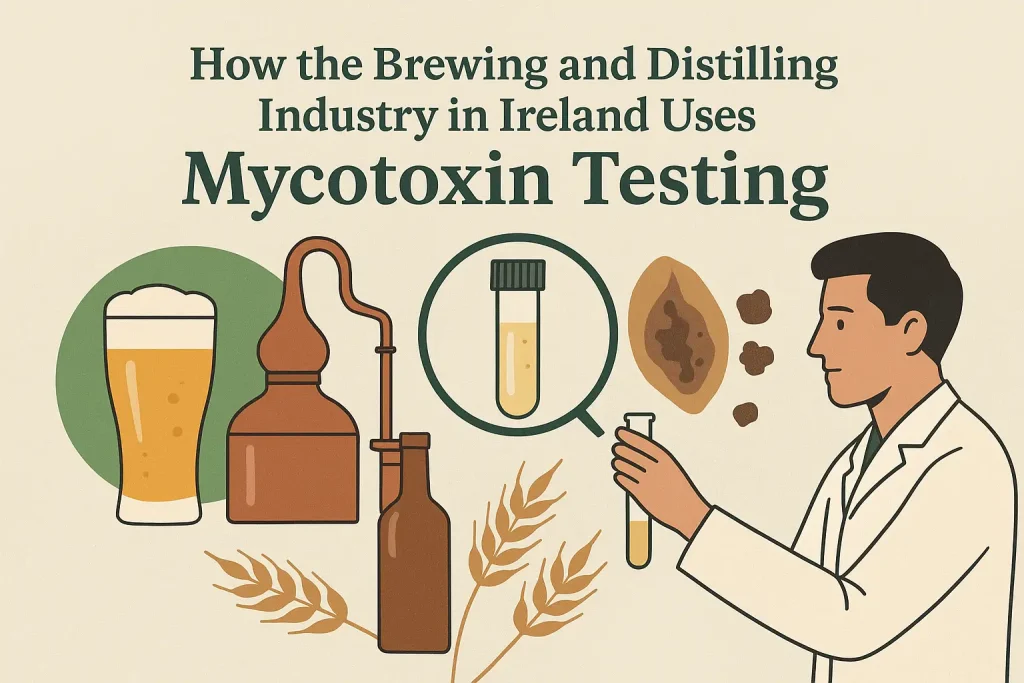Ireland is renowned for its world-class brewing and distilling heritage. From iconic Guinness stout to smooth Irish whiskeys and craft gins, the nation’s beverages are celebrated for their rich flavor and impeccable quality. Behind this reputation lies a sophisticated network of quality control processes that ensure every pint and dram meets the highest standards of safety and taste.
One of the most critical—yet often overlooked—processes in this chain is mycotoxin testing. Mycotoxins, toxic compounds produced by certain molds, can contaminate raw ingredients such as barley, wheat, rye, and maize. Left unchecked, they can compromise product quality, harm consumer health, and damage brand reputation.
In Ireland’s thriving brewing and distilling sector, mycotoxin testing plays a pivotal role in maintaining safety, authenticity, and regulatory compliance. This article explores how Irish breweries and distilleries use advanced testing to uphold their long-standing tradition of excellence.
Understanding Mycotoxins: A Silent Threat in Grain Production
Before diving into how the industry manages testing, it’s important to understand what mycotoxins are and why they pose a challenge.
Mycotoxins are naturally occurring toxic metabolites produced by fungi such as Aspergillus, Penicillium, and Fusarium. These molds can grow on grains both in the field and during storage, especially under warm, humid, or damp conditions—common occurrences in Ireland’s variable climate.
The most common mycotoxins found in brewing and distilling grains include:
- Aflatoxins – among the most toxic, often linked to poor grain storage conditions.
- Ochratoxin A (OTA) – can affect malted barley and impact beer flavor stability.
- Deoxynivalenol (DON) – commonly known as vomitoxin- can reduce fermentation efficiency.
- Zearalenone (ZEA) – can mimic estrogenic activity, posing health concerns.
- Fumonisins – typically found in maize, used in some whiskey and craft beer recipes.
While modern farming and storage practices have greatly reduced risks, the presence of these toxins—even in trace amounts—can jeopardize the brewing process and consumer safety.
The Role of Mycotoxin Testing in Brewing and Distilling
The brewing and distilling industry in Ireland operates under strict quality controls. Raw ingredients, particularly grains, must meet specific standards before they can enter production. This is where mycotoxin testing comes in.
Testing typically occurs at multiple stages of the supply chain:
1. Raw Grain Procurement
Before breweries or distilleries purchase grains, suppliers must provide analysis certificates confirming that mycotoxin levels fall within acceptable limits. Many producers also perform independent verification testing for assurance.
2. Malt Production Stage
Maltsters, who convert raw barley into malt, conduct regular screening to ensure no contamination occurred during storage or germination. Since fungi can develop during these moist, warm processes, early detection is critical.
3. Pre-Production Testing
Before grains are mashed and fermented, samples are analyzed once more. This final check ensures that only clean raw materials enter the production process, maintaining consistency and safety.
4. Quality Assurance in Finished Products
Although mycotoxins generally do not survive the distillation process and are minimally present in beer due to dilution, many Irish producers still perform end-product verification to ensure regulatory compliance and uphold consumer trust.
Why Mycotoxin Testing Is Essential for Irish Producers?
1. Protecting Consumer Health
Even at low concentrations, mycotoxins can pose significant health risks, including liver and kidney damage, immune suppression, and carcinogenic effects. Testing safeguards consumers from exposure to harmful substances.
2. Preserving Product Quality
Mycotoxin contamination can alter fermentation efficiency, affect yeast performance, and change the flavor profile of beer or whiskey. For an industry built on taste, this is unacceptable.
3. Ensuring Regulatory Compliance
The European Union enforces strict maximum levels for mycotoxins in food and feed products. Irish producers must comply with these regulations to sell both domestically and internationally. Routine mycotoxin testing in Ireland ensures that producers meet these standards consistently.
4. Protecting Brand Reputation
Ireland’s brewing and distilling brands are synonymous with quality. A single contamination incident can harm years of reputation-building. Consistent testing is a proactive measure that protects brand integrity and consumer loyalty.
Advanced Testing Technologies Used in Ireland
Irish breweries and distilleries employ a mix of traditional and advanced analytical techniques to detect and quantify mycotoxins. The most common include:
1. ELISA (Enzyme-Linked Immunosorbent Assay)
This method is fast, cost-effective, and ideal for high-throughput screening. It identifies specific mycotoxins based on antigen-antibody reactions and is widely used in preliminary testing.
2. HPLC (High-Performance Liquid Chromatography)
HPLC provides more detailed quantitative results and can detect multiple mycotoxins simultaneously. It’s particularly useful for confirming positive ELISA results.
3. LC-MS/MS (Liquid Chromatography–Tandem Mass Spectrometry)
The gold standard for mycotoxin detection, LC-MS/MS offers unparalleled sensitivity and specificity. Many Irish testing laboratories use this technology to ensure the most accurate results.
4. Rapid On-Site Test Kits
To support supply chain monitoring, portable testing kits are now common on farms and in malt houses. These allow for real-time decision-making and early detection before contamination spreads.
Collaboration Across the Supply Chain
The effectiveness of mycotoxin management in Ireland’s brewing and distilling industry relies on strong collaboration across the entire supply chain.
Farmers
Farmers play the first and most crucial role. They adopt integrated pest management, proper crop rotation, and careful drying and storage practices to minimize fungal growth. Educational programs from Teagasc (Ireland’s Agriculture and Food Development Authority) help farmers stay informed about climate-driven risks and prevention strategies.
Maltsters
Maltsters perform rigorous testing at every stage of malting—from barley intake to finished malt. Their quality control labs work closely with certified testing centers to ensure results meet EU standards.
Brewers and Distillers
Producers maintain stringent quality assurance systems. Many leading Irish brands have dedicated laboratory teams or partner with accredited facilities specializing in mycotoxin testing in Ireland to verify every batch’s purity.
Regulatory Bodies
The Food Safety Authority of Ireland (FSAI) and the Department of Agriculture enforce testing protocols, establish limits, and ensure compliance across the industry. They also collaborate with research institutions to monitor emerging mycotoxin trends.
Sustainability and Climate Challenges
As Ireland’s climate continues to experience shifts in temperature and rainfall, mycotoxin management is becoming increasingly complex. Wetter harvest seasons and warmer summers can create ideal conditions for fungal growth.
To address these challenges, Irish producers are adopting sustainable and data-driven solutions:
- Precision Agriculture: Farmers use satellite imagery and predictive modeling to identify potential fungal hotspots in real time.
- Climate-Resilient Crops: Research into new barley and wheat varieties resistant to fungal infection is underway.
- Improved Storage Infrastructure: Modern grain silos and drying systems help reduce moisture and prevent contamination post-harvest.
- Circular Economy Approaches: Spent grains and by-products are repurposed as animal feed, with rigorous testing to ensure safety throughout reuse.
Case Study: Irish Whiskey’s Commitment to Purity
Irish whiskey is one of the country’s fastest-growing exports, enjoyed globally for its smoothness and authenticity. Distilleries such as Jameson, Bushmills, and emerging craft producers are deeply committed to maintaining quality and safety standards.
Before grains ever reach the mash tun, they undergo comprehensive testing for moisture, protein, and mycotoxin content. Distillation removes most contaminants, but the industry maintains strict oversight to protect the integrity of its raw materials.
This commitment extends beyond production: many distilleries partner with local farmers to ensure that barley cultivation follows sustainable, low-risk practices. Such cooperation ensures that the “grain to glass” process remains transparent, safe, and authentically Irish.
Future Trends: Innovation in Mycotoxin Detection
Technology continues to evolve, making testing faster, more accurate, and more accessible. Irish laboratories and research centers are exploring several promising advancements:
- AI-Powered Predictive Models: Artificial intelligence can analyze weather patterns and crop data to predict potential outbreaks of fungal contamination.
- Smart Sensors: Emerging sensor technology allows for real-time monitoring of grain storage environments.
- Blockchain Traceability: Secure data sharing enables full transparency from farm to bottle, giving consumers confidence in product safety.
By embracing innovation, Ireland’s brewing and distilling industry ensures it remains resilient and competitive on the global stage.
Conclusion:-
The success of Ireland’s brewing and distilling industry is built on a delicate balance between tradition and innovation. While centuries-old recipes and methods define the character of Irish beverages, modern science ensures that they remain safe, consistent, and globally admired.
Mycotoxin testing is at the heart of this balance. It protects consumer health, preserves the purity of iconic Irish drinks, and upholds the nation’s reputation for craftsmanship. From farm to fermentation, every step reflects Ireland’s unwavering commitment to quality.
As the industry continues to evolve, producers are not only testing for mycotoxins but also integrating broader environmental monitoring into their sustainability strategies. By adopting environmental mycotoxin testing, Irish brewers and distillers are ensuring that the legacy of Ireland’s liquid gold remains safe, sustainable, and world-renowned for generations to come.
Frequently Asked Questions:-
1. What are mycotoxins, and why are they dangerous?
- Mycotoxins are toxic compounds produced by molds that can grow on grains like barley, wheat, or maize. They can pose serious health risks, including liver and kidney damage, immune suppression, and even cancer if consumed in high quantities. For brewers and distillers, they also affect fermentation and product flavor, making mycotoxin testing essential.
2. Why is mycotoxin testing important in Ireland’s brewing and distilling industry?
- Mycotoxin testing helps Irish breweries and distilleries ensure that their raw ingredients meet strict safety and quality standards. It prevents contamination, protects consumer health, ensures compliance with EU regulations, and maintains the high reputation of Irish beverages worldwide.
3. How often do breweries and distilleries test for mycotoxins?
- Testing occurs at several points: when grains are purchased, after malting, before fermentation, and sometimes in finished products. Regular testing ensures consistent safety and quality across every batch of beer or whiskey produced.
4. What testing methods are commonly used in Ireland for detecting mycotoxins?
- Irish laboratories and producers use a mix of technologies, including ELISA for quick screening, HPLC for accurate quantification, and LC-MS/MS for advanced multi-mycotoxin detection. Many also use rapid on-site kits to make real-time decisions during grain intake.
5. Are mycotoxins destroyed during brewing or distilling?
- While the brewing and distilling processes can reduce mycotoxin levels, they do not always eliminate them entirely. That’s why testing raw materials before production is vital to ensure the final product remains safe and compliant with regulations.


